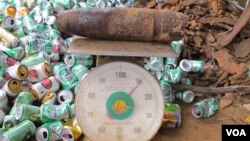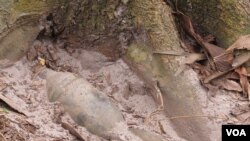QUANG TRI —
The number of war-era bombs and mines reported in central Vietnam has risen in recent years as more contaminated land is cleared for development. Many people know the dangers but accidents continue to claim lives.
Nearly 40 years after the Vietnam War, an estimated 600,000 tons of unexploded ordnance, known as UXO, remain in the ground. Vietnamese authorities said these mortars, bombs and grenades have killed or wounded around 100,000 people since the war's end.
One of the most heavily contaminated provinces is Quang Tri, the scene of many ferocious battles and located just below the former demilitarized zone that once separated North and South Vietnam.
Although non-governmental organizations have been removing unexploded ordinance in the province for over a decade, more land development and a better reporting system has lead to an increase in the amount of dangerous materials found in recent years.
Henk Liebenberg is technical operations manager for the Mines Advisory Group, known as MAG, in Quang Tri. MAG destroyed around 7,500 items in 2009. In 2012, the group destroyed more than 17,000.
He said, “In January we went to a village where the community liaison team works and we found nearly 50 submunitions of where the locals said, sometimes about 500, 600 meters away from where they actually live, where they do their work in the forest.”
Ordnance clearance groups now have hotlines for residents to call when they find war-time munitions. Community liaison officers also go house to house to get information directly. This, Liebenberg said, is another reason why more are being reported.
Last month another group named Project Renew was called in to destroy a French mortar and U.S. grenade near an acacia plantation just meters away from a kindergarten.
Development and Public Affairs Officer Ngo Xuan Hien was at the scene. He said the site was well known for being contaminated by unexploded ordnance. “About two kilometers from here is the Quang Tri citadel which is very notorious for fighting in 1972 so it’s very common to see UXO remains scattered all over the place,” he added.
Many Vietnamese seek out the unexploded ordinance to sell the metal for scrap, sometimes taking great risks to illegally remove the explosives to sell to rock quarries or fishermen.
However, one of MAG's Senior Community Liaison officers, Le Van Minh, said the number of scrap metal dealers has decreased in recent years, in part because of the economic slowdown which has hit the construction industry.
Most ordinance clearing groups concentrate in Quang Tri, although there is some activity in nearby provinces. Awareness in other parts of the country is not high and the results can be fatal. At the end of last year two accidents claimed the lives of five children.
Neither the United States nor Vietnam have signed the Anti-Personnel Mine Ban Convention of 1997 nor the 2008 Convention on Cluster Munitions. Experts say Vietnam is holding back so it can preserve its mine fields in the north of the country as a buffer against China, but it is making progress in negotiations on the treaty against cluster bombs.
Nearly 40 years after the Vietnam War, an estimated 600,000 tons of unexploded ordnance, known as UXO, remain in the ground. Vietnamese authorities said these mortars, bombs and grenades have killed or wounded around 100,000 people since the war's end.
One of the most heavily contaminated provinces is Quang Tri, the scene of many ferocious battles and located just below the former demilitarized zone that once separated North and South Vietnam.
Although non-governmental organizations have been removing unexploded ordinance in the province for over a decade, more land development and a better reporting system has lead to an increase in the amount of dangerous materials found in recent years.
Henk Liebenberg is technical operations manager for the Mines Advisory Group, known as MAG, in Quang Tri. MAG destroyed around 7,500 items in 2009. In 2012, the group destroyed more than 17,000.
He said, “In January we went to a village where the community liaison team works and we found nearly 50 submunitions of where the locals said, sometimes about 500, 600 meters away from where they actually live, where they do their work in the forest.”
Ordnance clearance groups now have hotlines for residents to call when they find war-time munitions. Community liaison officers also go house to house to get information directly. This, Liebenberg said, is another reason why more are being reported.
Last month another group named Project Renew was called in to destroy a French mortar and U.S. grenade near an acacia plantation just meters away from a kindergarten.
Development and Public Affairs Officer Ngo Xuan Hien was at the scene. He said the site was well known for being contaminated by unexploded ordnance. “About two kilometers from here is the Quang Tri citadel which is very notorious for fighting in 1972 so it’s very common to see UXO remains scattered all over the place,” he added.
Many Vietnamese seek out the unexploded ordinance to sell the metal for scrap, sometimes taking great risks to illegally remove the explosives to sell to rock quarries or fishermen.
However, one of MAG's Senior Community Liaison officers, Le Van Minh, said the number of scrap metal dealers has decreased in recent years, in part because of the economic slowdown which has hit the construction industry.
Most ordinance clearing groups concentrate in Quang Tri, although there is some activity in nearby provinces. Awareness in other parts of the country is not high and the results can be fatal. At the end of last year two accidents claimed the lives of five children.
Neither the United States nor Vietnam have signed the Anti-Personnel Mine Ban Convention of 1997 nor the 2008 Convention on Cluster Munitions. Experts say Vietnam is holding back so it can preserve its mine fields in the north of the country as a buffer against China, but it is making progress in negotiations on the treaty against cluster bombs.





